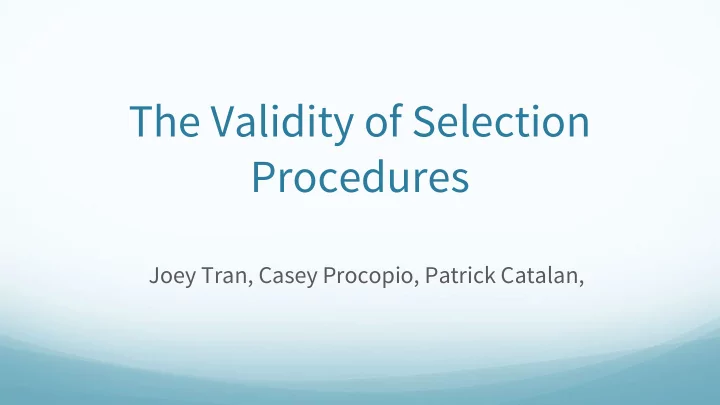

The Validity of Selection Procedures Joey Tran, Casey Procopio, Patrick Catalan,
Situation Assessment as an Ignored Factor in the Behavioral Consistency Paradigm Underlying the Validity of Personnel Selection Procedures -Joey Tran
Key Terms Behavioral Consistency ● AC (Assessment Center) ● Situational Assessment ● Cognitive Ability ●
Hypothesis “Individual difference in assessing situational demands will predict job performance.”
Method N = 124 (67 men, 57 women) ➢ 2 Assessors ➢ 7 Dimensions assessed (Analytical, Creativity, Presentation, Organizing, ➢ Persuasiveness, Assertiveness, Consideration)
Result
Take Home Message ★ Determine if AC is right for your company/role. ★ Filter out insignificant criterions or use other alternatives. ★ Implement situational judgement tests to predict success.
“The Ability to Identify Criteria: Its Relationship With Social Understanding, Preparation, and Impression Management in Affecting Predictor Performance in a High-Stakes Selection Context ” -Casey Procopio
Key Terms ● ATIC: Ability to Identify Criteria ● CAPS: Cognitive-Affective Identify Criteria ● ATAR: Australian Tertiary Admission Rank) Percentile score based on the performance of the high school examinations.
Hypothesis “The effect of ATIC on MMI will depend on a degree of IM, whereby ATIC will have a weaker effect on performance for those who engage in high impression management”
Method
Result Social understanding and preparation had a positive effect on MMI performance though ATIC, only when they have a low IM Score.
Take Home Message ● In this case IM did not have a strong effect on ATIC or MMI scores; I would keep the standardized tests and remove the IM ranking.
“Is More Structure Really better? A Comparison of Frame-of-Reference Training and Descriptively Anchored Rating Scales To Improve Interviewer's Rating Quality” -Patrick Catalan
Purpose ● Unstructured Interviews can lead to differences when evaluating interview answers ● Increase in structure can reduce individual differences ● “Combining both anchored rating scales and FOR training will lead to more accurate ratings”
Key Terms ● Anchored Rating Scales: pre-determined scales ● FOR (Frame-of-Reference) Training: providing raters with appropriate standards pertaining to the dimensions to be rated and its emphasis on practice and feedback ● Differential Accuracy- accuracy in detecting differences in interviewees’ specific pattern of strengths and weaknesses across questions.
Method 4 Experimental Groups Using Only No Anchored Rating Anchored Rating Scales/ No FOR Training Scales Using Both Using Only FOR Anchored Rating Training Scales and FOR Training
Results
Take Home Message ● Increase interview structure by creating anchored rating scales for jobs and implement FOR training to employees who interview candidates. ● Improve productivity and legal issues
Group Take Home Message As a great Professor once said… .
Group Take Home Message Not all assessment centers are the same for every job Assess the job defined Decide if a job knowledge test, personality test, situational test or a structured interview may better fit the needs for your applicant.
Q&A
Recommend
More recommend